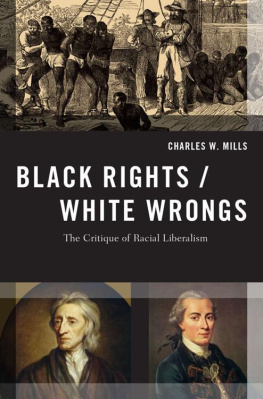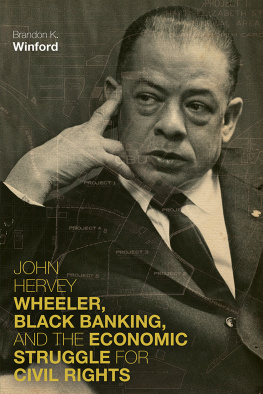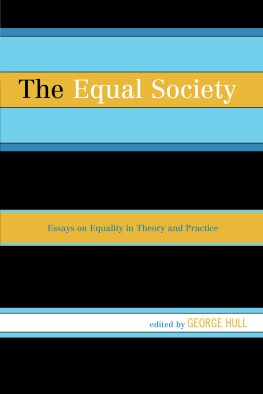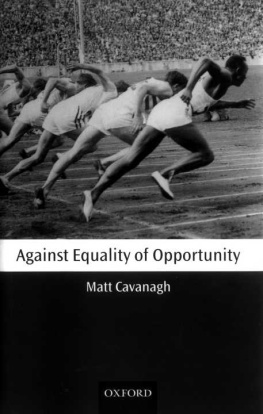This book is published with the assistance of a grant from the V Ethel Willis White Endowed Fund, established through the generosity of Deehan Wyman, Virginia Wyman, and the Wyman Youth Trust.
Publication is also supported by a grant from 4Culture.

2011 by the University of Washington Press
Printed in the United States of America
Designed by Pamela Canell
Typeset in Quadraat and Quadraat Sans
16 15 14 13 12 11 5 4 3 2 1
All rights reserved. No part of this publication may be reproduced or transmitted in any form or by any means, electronic or mechanical, including photocopy, recording, or any information storage or retrieval system, without permission in writing from the publisher.
University of Washington Press, PO Box 50096, Seattle, WA 98145, USA www.washington.edu/uwpress
Library of Congress Cataloging-in-Publication Data
Seattle in Black and white : the Congress of Racial Equality and the fight for equal opportunity / Joan Singler... [et al.].
p. cm. (V Ethel Willis White book)
Includes bibliographical references and index.
ISBN 978-0-295-99084-2 (hardback : alk. paper)
1. African AmericansWashington (State)SeattleHistory20th century. 2. African AmericansCivil rightsWashington (State)SeattleHistory20th century. 3. Civil rights movementsWashington (State)SeattleHistory20th century. 4. Congress of Racial EqualityHistory. 5. Seattle (Wash.)Race relationsHistory20th century. I. Singler, Joan.
F899.S49N464 2011 323.11960730797772dc22 2010035649
The paper used in this publication is acid-free and recycled from at least 30 percent post-consumer waste. It meets the minimum requirements of American National Standard for Information SciencesPermanence of Paper for Printed Library Materials, ANSI Z39.481984.
PREFACE
The civil rights movement of the 1960s was militant, was nationwide, and was shaped by innumerable leaders. It was an uprising of citizens insisting that American democracy should finally live up to its ideals. Yet only during Black History Month do public media and schools take much note of the dynamic changes wrought in the civil rights era. And then, the media tend to portray the civil rights movement as a great leader event, with Dr. Martin Luther King Jr. receiving the credit and the South being the arena. Others refer to Martin and Malcolm. These were extraordinary leaders, of course, as were others who may have faded from public memory, including Ella Baker, James Farmer, Fannie Lou Hamer, Dorothy Height, A. Philip Randolph, and Roy Wilkins. These and countless other leaders inspired thousands across the nation who rose up in action.
As they stood up for their rights in the 1950s and 1960s, African Americans in the South suffered ruthless suppression. The brutality, portrayed on television, shocked viewers everywhere. We, far in the Northwest, were inspired to champion their rights both in the South and at home. Joan and Ed Singler and a handful of others established a chapter of COREthe Congress of Racial Equalityand hundreds of us joined.
CORE, founded in Chicago in 1942 by James Farmer and other Christian pacifists, adopted Gandhis philosophy of noncooperation with evil and pioneered many of the nonviolent direct action techniques of the civil rights movement. It was one of four national organizations that led the This book, we hope, will let twenty-first-century readers see and feel the efforts and accomplishments of civil rights activists of the 1960s.
The seeds of this book were planted when, at Walt Hundleys memorial service in 2002, it became clear that memories of events were failing and that a number of Seattle CORE activists were dying. Bettylou Valentine and Joan Singler recognized the necessity of recording Seattle civil rights activities and events as recalled by the participants themselves. To collect memories they mailed out a questionnaire to all former CORE activists whose addresses they could find, and they started research in the University of Washington library archives. Unfortunately, limited response to the questionnaire left the project in limbo. After the death of Don Matson, more resources became accessible when boxes of Seattle CORE files from Dons basement went to Joan and Ed Singler. Maid Adams joined the project, though with some trepidation over the amount of work required. At about the same time, Jean Durning, volunteering at Martin Luther King Jr. Elementary School, was inspired to write about Seattle civil rights efforts. She saw how little information on the local movement was available for school celebrations of Dr. Kings birthday or Black History Month. Remembering the questionnaire, Jean phoned Joan Singler and the book was under way.
The authors are all early Seattle CORE members and all served as officers, committee heads, or project leaders. We each had moved to Seattle as young adults, but our backgrounds varied. Bettylou Valentine grew up We were idealistic. The pledge of allegiance was our sacred vowto strive for Liberty and Justice for All.
We four women were active in leadership roles in Seattle CORE, building on our previous community experience. Joan Singler, one of the founders of the Seattle chapter, was a leader in open-housing campaigns. Jean Durning became a negotiator on employment and organized some dramatic CORE demonstrations. Bettylou Valentine, active against housing discrimination, became COREs most conscientious secretary. Maid Adams (then called Jean Adams), cochair of the Negotiations Committee and a Freedom School coprincipal, was the only one of us still active in Seattle CORE when it became exclusively black in 1968. We all became friends through Seattle CORE. Like other CORE members, we earnestly believed that our goal of a just and integrated society would be achieved in our lifetime.
Like all CORE projects, this book is a cooperative undertaking. In addition to the memories of the four authors, two dozen former Seattle CORE members contributed their thoughts and recollections. Unfortunately, many members have died, particularly African American men (see )sadly exemplifying the statistics that black men on average have life spans shorter than those of white men and of women, both black and white. We feel an urgency to share our memories before all participants in the momentous efforts of the movement are forgotten. The times were intense and left us with many clear, specific memories. Some of these memories, were gratified to find, closely match stories in 1960s newspaper clippings.
This book is both a researched history and a joint memoir. Joan Singler and parts of other chapters. Although individuals wrote first drafts of specific chapters, the book is truly written by all of us. Research, reminiscences, discussion, rewriting, and editing from all four were contributed throughout the book, and the content benefited substantially from the attention of four minds. Our process also emphasizes an important CORE principlecollective work plus a collective consciousness. Forty-plus years after the events, we remain a cohesive voice.
The spirit that infused CORE members still inspires us. After the party to celebrate Seattle COREs twenty-fifth anniversary, former CORE members went to protest apartheid by picketing the home of the South African consul. In 2004 several former CORE members, including two of the authors, traveled to Florida to participate in the Election Protection Coalition to guard the hard-won right to vote, particularly of African American voters. On October 3, 2004, reporting on our trip to Florida,








